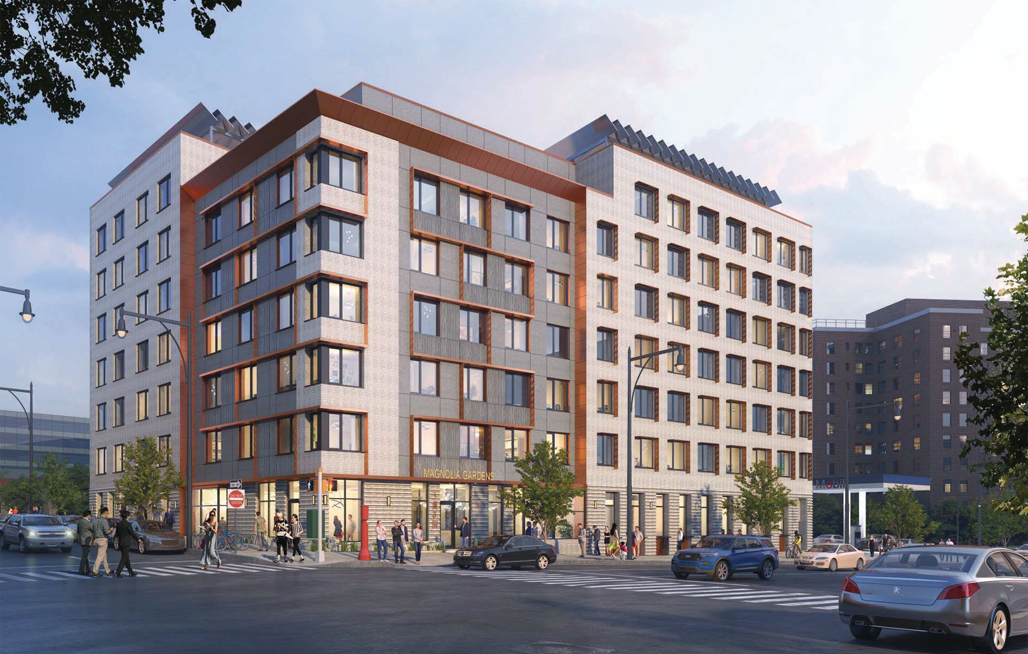Part 1 in a 4 part series on Magnolia Gardens, our transitional housing facility coming to Flushing, Queens.
Beneath the hustle and bustle in downtown Flushing lies the harsh reality that too many Asian families are struggling to survive. They are hard-working, but under-employed, not earning enough to afford an apartment with a lease. Instead, they live in overcrowded and illegally-converted housing, renting rooms – and even beds – in basements and garages.
They are “housing insecure” because they can lose their housing when roommates decide their time is up. When a fire, flood, or abusive partner forces them to flee. Or when a family can no longer pay rent after a job loss or a death in the family. A widow who received emergency cash assistance, for example, lost her husband to COVID-19 and has to support three children. She is undocumented and works part-time in a garment factory, earning $325 per week. Her monthly rent is $1,500. How long can she and her children stay housed when her wages do not fully cover the rent?
These are the dire situations Magnolia Gardens, a 90-unit transitional housing facility for families with children to be built at 133-04 39th Avenue, is designed to address. This will be the first facility in New York City to provide Asian language access and services, removing barriers for Chinese and other Asian families to find help. It will also be the first transitional housing facility of its kind in Community District 7. Asian families in Flushing will benefit not only from safe and secure housing at Magnolia Gardens but also comprehensive services, including:
*Assistance in finding permanent housing and rent subsidies
*Job training and placement
*Daycare and after school programs
*Public benefits and immigration assistance
Transitional housing also provides a critical pathway into affordable housing, since it is far easier to place families experiencing housing insecurity once they have been in shelter. So no matter how many billions the city spends on affordable housing, there will still be a need for transitional housing to help families establish the stable employment and income they need to be eligible for affordable housing.
Low-income families are under more financial stress than ever before. During the pandemic, Asian women experienced the greatest change in unemployment, from a pre-pandemic unemployment rate of 3.0% to a peak of 16.4% in May 2020. Asians are also experiencing longer periods of unemployment: Asian men have an average unemployment period of 46.2 weeks and Asian women an average of 33.9 weeks, more than twice as long as other racial groups. Flushing rents are back to pre-pandemic levels (1-bedroom average rent is more than $2,000 per month) and the rising cost of essentials: food, utilities, and transportation are forcing more families to move in together. With no more emergency rental assistance available, families are at greater risk of falling into homelessness.
Magnolia Gardens is purpose-built to serve only families with children. Families with children attending school, or whose last place of residence was in Community District 7, will receive priority placement at Magnolia Gardens, to be closer to their schools and jobs. (Last year, 1,877 students attending public schools in District 25, which serves Flushing, lived in temporary housing either double or tripled up with other roommates, in hotels, or shelter.)
*23 studio apartments are designed for single women with one or two children, which is the most common type of family in need of housing and services today.
*62 1-bedroom units and five 2-bedroom units will serve larger families with children. Each unit will have its own kitchen and bathroom, providing families with the privacy and safety not available in day shelters.
In the future, if there is a steady decline in the number of families who need transitional housing at Magnolia Gardens, the apartments will be converted into permanent affordable housing. Building permanent affordable housing today on the property owned by AAFE is impossible without tens of millions of dollars in additional funding that is not available. AAFE has almost 50 years of experience in building and preserving more than 1,000 units of affordable housing in the city. We know what it takes to build affordable housing like One Flushing, a 231-unit building on 41st Avenue, where the majority of families earn less than $60,000 in annual income. Developers who oppose Magnolia Gardens cite examples of affordable housing they created that require as high as $192,000 in annual income for a low-income family to live in one of their buildings. When they had an opportunity to support more affordable housing in the Special Flushing Waterfront District, these developers were silent.
We bring our experience as Asian Americans who, like so many of the 1.2 million Asian Americans in New York City, are still living in a constant state of vigilance for our personal safety and those we love – including elderly parents and siblings who live in Chinatown. We have felt the anger and the anguish each time an Asian person is attacked or killed. And we understand the pain of being asked to show compassion when it does not feel like the same is extended to our communities. We believe, however, that providing housing and services for the housing insecure must be a part of the solution for breaking the cycle of homelessness and poverty.
We owe it to the almost 2,000 students in Flushing who are living with the stress and fear of homelessness to take action today, providing them and their parents with the support to build more stable lives, and the hope that they can achieve financial independence and success in a brighter future.

